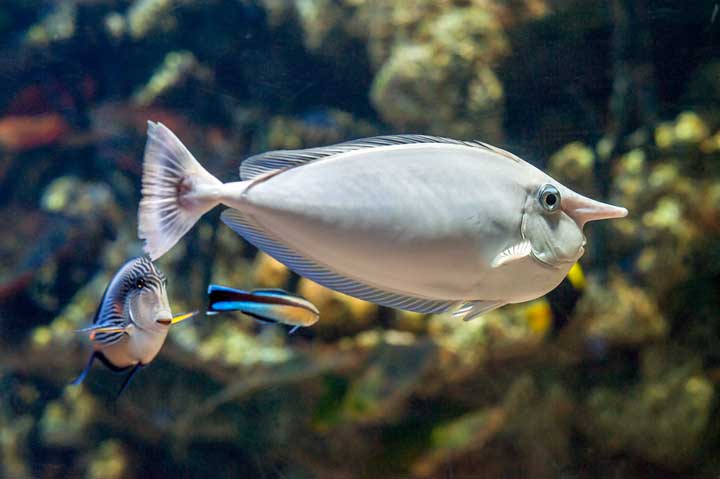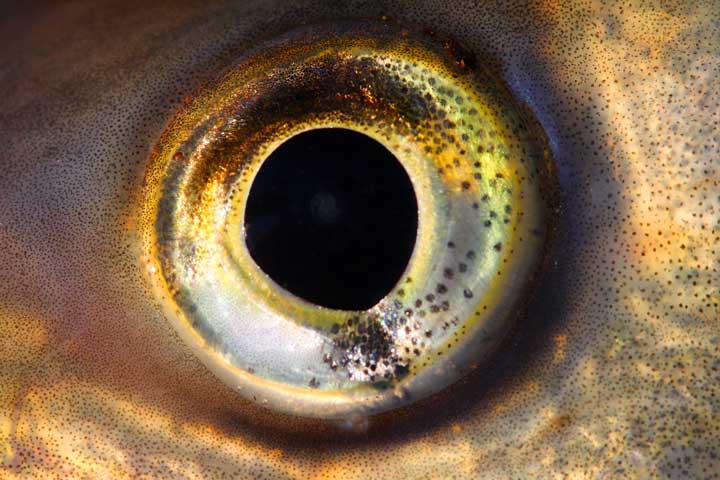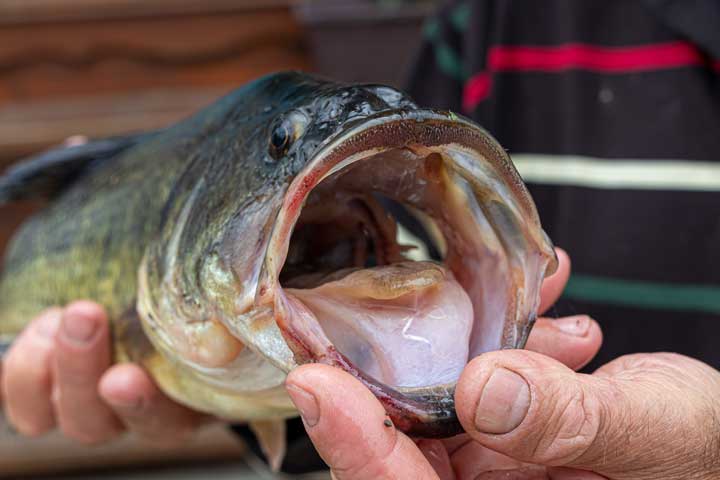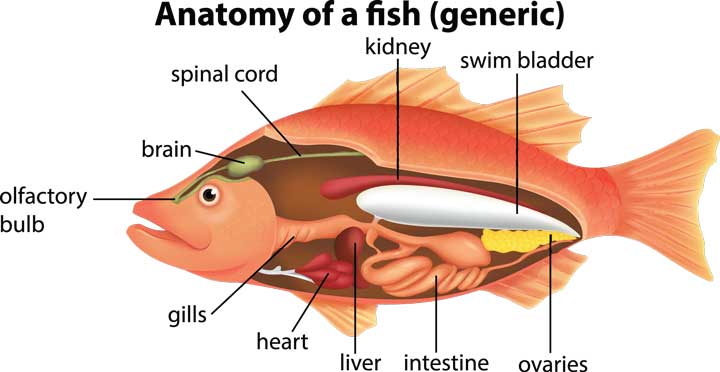From humans to insects to blue whales and everything in between, all animals rely on their senses to navigate their environment. Fish, in particular, have some of the most developed sensory systems of any animal on earth, and they rely on these senses to survive and thrive.
Today, we’ll cover everything you need to know about fish senses, how they work, and how fish use them. We’ll also reveal the unique sensory organ fish possess, which humans don’t.
The Five Fish Senses
Like humans, fish possess five senses. Although, they aren’t the same five as people. Fish can smell, see, taste, and hear, but they feel things quite differently. Here’s how fish use their senses to navigate their environment.
How Fish Smell

Fish have an incredibly well-developed sense of smell that is thought to be about 1,000 times more powerful than humans, depending on the species. Unlike humans, who use their noses to breathe and smell, fish use their noses exclusively to smell.
Fish smell through two openings on their face known as nostrils or nares, and the nares lead to a passage that’s lined with sensory pads that help fish interpret what they’re smelling. Fish are constantly in motion to keep water moving over these sensory pads. Without constant movement, their sense of smell is less sharp.
Fish use their sense of smell to locate prey and also for navigation. Salmon, for example, use their sense of smell to navigate to the precise stream where they were born so they can spawn in that stream.
How Fish See
While eyesight is one of human’s most powerful senses, that isn’t the case with fish. Most fish can only see about 12-15 feet in front of them in ideal water conditions. When visibility is lower, fish have an even harder time relying on their eyesight.
Fish eyes are located on either side of their heads, allowing them to see in every direction except directly behind them and straight down. Their eyes can move independently from each other, allowing them to see a complete picture of what’s around them.

Unlike humans, fish don’t have eyelids, and their pupils remain a fixed size regardless of the amount of light entering their eyes.
To protect their eyes from direct sunlight, fish will often move to deeper water in the daytime or seek shade underneath tree overhangs or beneath rocks or lily pads.
Coastal and near-shore species can perceive color about, as well as humans, can, if not better. Fish that live in deeper waters have difficulty seeing color since so much color is lost in deeper water where light doesn’t penetrate as well. That isn’t to say that these fish wouldn’t also see colors under ideal conditions; they just don’t see color in depth and darkness.
How Fish Taste
Fish have a well-developed sense of taste that they also use to help them locate food. Some species rely more on their sense of taste than others. Fish have tongues, and like humans, their tongue contains thousands of taste buds that allow them to taste their food.

Walleye, for example, also have taste buds on their mouths and face that allow them to taste things without ever needing to open their mouths. Other fish, such as Bullhead catfish, have taste buds running the length of their bodies, which help them locate food.
Some species, including catfish and carp, have whisker-like appendages on their face called barbels, and they use their barbels to scour the seafloor in search of food.
How Fish Hear
Fish might not have ears, but that doesn’t mean they don’t have an adept sense of hearing. While their ears aren’t visible, they do have sensory organs under their skin near their eyes that allow them to hear.
The structure of this organ is quite similar to the human ear, and it enables fish to maintain their balance and hear what’s around them. These organs are incredibly sensitive, allowing fish to hear a struggling baitfish hundreds of feet away from them.
Anglers needn’t fret too much because a fish’s adept sense of hearing doesn’t mean that they can also hear what’s going on above the water. Water is an excellent transmitter of sound, provided the sound is occurring underwater. Sound traveling through the water from land is less likely to reach fish.
So, while you don’t have to worry about scaring the fish away by talking, you’ll want to avoid loud noises that transmit through the water more easily, such as stomping around the deck of a boat or dropping an anchor.

Lateral Lines
The fifth sense that fish possess is known as the lateral line. The lateral line runs on either side of a fish’s body from their head to tail, and they contain tiny pores which connect microscopic hairs to nerve endings under the skin.
These tiny hairs detect the vibrations that other fish and aquatic life are sending through the water, allowing fish to sense where it’s coming from even before they can see them. This sense is one of the ways that fish can locate prey and avoid predators.
This sense also allows fish to feel changes in depth, water pressure, and currents and detect inanimate objects like rocks, aquatic plants, and debris.
If you’ve ever wondered how fish can swim so tightly in a school without bumping into each other, their lateral line sense is the reason.
Frequently Asked Questions
Here’s everything you’ll need to know about the most common questions people have when it comes to how fish smell, hear, see, and perceive their environment.
Can fish smell?
Yes. Fish have one of the most refined senses of smell of any animal. Fish use their sense of smell to locate food and also to help them navigate the ocean. In deeper water, fish rely on their sense of smell more than any other sense.
What smells are fish attracted to?
The smells that fish are attracted to vary from species to species. Catfish, for example, are notoriously attracted to especially smelly scents that humans would find disgusting.
Most fish are attracted to smells like fish slime and fish guts. Surprisingly, many fish seem drawn to the scent of human saliva.
Can fish smell humans?
While fish may not be able to connect what they’re smelling to humans, they know to avoid many of the scents associated with humans.
Fish can smell the oils from human skin, sunscreen, bug spray, cologne or perfume, diesel or gas, and marine grease. When fish sense these smells, they tend to avoid them.
Can fish smell better than humans?
A fish’s sense of smell is significantly more developed than humans and is thought to be 1,000 times more powerful than the human sense. Fish use smell to find food, navigate their environment, and avoid predators, so a highly developed sense of smell is necessary.
While some fish have a better sense of smell than others, all fish have a much better sense of smell than humans.
Do fish scents really work?
Fish scents are a proven way for anglers to catch more fish, and different species are drawn to different scents. Fish are attracted to the smell of fish oil, guts, or fish slime, as well as bait attractants.
Do fish like Stinky bait?
What may smell disgusting to humans smells like a delicacy for fish. Most fish are attracted to stinky bait, especially catfish, who love to eat bait that smells notoriously bad.
Fish attractants such as menhaden oil or Gulp smell especially rotten, and they both help anglers catch significantly more fish.
Can fish hear you?
Fish have a well-developed sense of hearing that helps them locate prey and avoid predators. Fish have ears located under their skin near their eyes. The structure of their ears is surprisingly similar to that of humans.
Their sense of hearing is so well developed that a fish can hear a baitfish struggling on the seafloor 100 feet below them.
Do fish see?
Fish can see, but sight is their weakest sense. Even in clear water with ideal conditions, most fish can only see about 15 feet in front of them. A fish’s eyes move independently, and they can see in every direction but directly below them and behind them.
Do fish see water?
Just as humans don’t see the air we breathe, fish don’t see water, necessarily. In the sea, fish don’t live in water that’s crystal clear.
The water has suspended particulate matter, microorganisms, and other debris, which fish can see. So while they don’t see water, they can see the matter that’s suspended in the water.
Do fish see us?
Yes, fish can see humans. Most fish have a fairly basic sense of sight and can’t see too far in front of them, but if a human is in a fish’s line of vision, it will see them.
Do fish see color?
Fish do see color. Depending on the type of fish, their ability to process color may be better or worse. Fish that live in shallower water are much more adept at seeing color, and they can see almost all the same colors that humans can.
In deeper water, where light and color don’t transmit well, fish don’t see as many colors.
What is a fish’s best sense?
Most of a fish’s senses are incredibly well developed and more sensitive than humans and most other animals. Their sense of smell is incredibly sensitive, but their most useful sense is arguably their lateral lines.
Lateral lines comprise thousands of nerve endings under the skin that detect vibrations in the water so fish can sense prey and predators nearby.
How do fish see and feel?
Fish can see and feel in many of the same ways that humans can. A Fish’s eyes work similarly to humans, and they transmit information to the fish’s brain so they can process it. Fish feel using their lateral lines, which is like a sixth sense that allows them to sense vibrations in the water.
What is the primary sensory organ on a fish?
Fish have a variety of sensory organs that allow them to sense their environment. Many of these organs work similarly to how they work for humans and other animals. While a fish’s lateral lines and sense of smell act as their primary sources of information for their environment.
What does Electroreception mean?
Electroreception is a sense that some fish and aquatic animals have that allows them to sense the electrical stimuli that are generated by other fish. Sharks, rays, electric eels, and a few other fish species possess this sense, allowing them to locate prey and avoid predators.
What does Electrosensory mean?
Electrosensory refers to systems that allow fish to sense faint electrical fields which are generated by other organisms. The electrosensory system is derived from a fish’s lateral line system, and it can detect both electrical fields and changes in the water around them.
Some fish, such as sharks and rays, have a more highly developed electrosensory system.
Can fish hear?
Yes, fish can hear using an organ that’s quite similar to the human ear. A fish’s ears are located beneath the skin on their head, near their eyes, and they use this sense to hear noises in much the same way as humans.
Can fish hear humans?
Fish have an excellent sense of hearing, and they can hear practically everything in their environment. Fish don’t necessarily hear humans, but they can hear many of the things we do on the water.
Sound that’s transmitted directly into the water is much easier for fish to triangulate and react to, so while talking might not spook a fish, sloshing around in the water or walking around a boat can.




